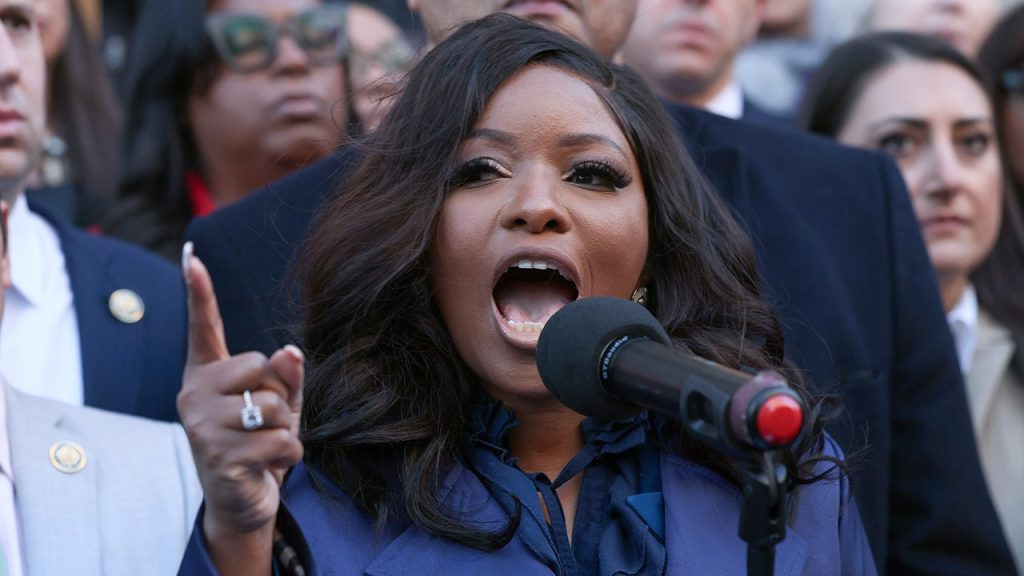In a recent statement, Rep. Jasmine Crockett, a Democrat from Texas, strongly criticized Republicans for their response to the devastating floods that struck central Texas over the Fourth of July weekend, resulting in over 120 fatalities. Crockett accused her Republican counterparts of attempting to roll back climate change initiatives, which she believes exacerbated the disaster’s impact. The remarks ignited a heated debate about climate policy amidst a backdrop of severe weather events affecting the region.
| Article Subheadings |
|---|
| 1) Crockett’s Accusations Against Republicans |
| 2) The Impact of the Floods |
| 3) Political Responses to the Tragedy |
| 4) Climate Change and Policy Debate |
| 5) Fallout from the Comments |
Crockett’s Accusations Against Republicans
Rep. Jasmine Crockett did not hold back in her criticism of Republicans during interviews following the floods that devastated parts of Texas. She accused the party of prioritizing their political agenda over the welfare of their constituents. In her remarks, she specifically targeted the Trump administration and the measures implemented by Secretary of Homeland Security Kristi Noem. Crockett expressed disappointment over what she described as a delayed response to the flooding crisis, which left many families in dire need of assistance. “The least that they could do is believe in helping American people,” she stated on a televised segment. These comments reflect a growing frustration among some Democratic leaders regarding their Republican colleagues’ stance on climate change and disaster response.
The Impact of the Floods
The floods that occurred during the Fourth of July weekend in Texas had devastating consequences, with reports of over 120 fatalities and dozens still missing. Emergency services and local authorities scrambled to assist those affected, while searching for missing persons became a priority amidst the chaos. The floodwaters, attributed in part to climate change, overwhelmed drainage systems and flooded homes, leading to widespread destruction. The tragedy has raised serious questions about the state’s preparedness for natural disasters and the adequacy of federal support systems in place to help Texans in times of crisis.
Political Responses to the Tragedy
In the wake of the flooding, various political figures have responded in contrasting ways, with some blaming climate change and others defending their party’s actions. Democrats, including Crockett, have quickly seized upon the situation to emphasize the necessity of robust climate action. They argue that recent cuts to the National Weather Service (NWS) under the Trump administration contribute to the challenges faced during such disasters. Meanwhile, Republican officials have defended their policies, with some suggesting that the politicization of the floods is improper and detracts from the need for immediate support and assistance to the victims.
Climate Change and Policy Debate
The debate over climate change has intensified, particularly in the context of recent disasters in Texas. Crockett’s accusations against Republicans have reignited discourse on climate policy and funding for environmental initiatives. She argues that the rollback of climate change measures, including those aimed at mitigating the effects of global warming, directly contributes to worsening weather conditions. The political divide remains stark, with Democrats advocating for more proactive measures and Republicans defending their positions on government spending and resource allocation. The challenge lies in finding common ground, especially as natural disasters become more frequent.
Fallout from the Comments
Crockett’s comments have sparked sharp reactions from various quarters, including both supporters and critics. While many Democrats applauded her for addressing the urgent issue of climate change head-on, others, including some from the Republican party, have labeled her remarks as insensitive and unconstructive in the face of tragedy. The White House also weighed in; a spokesperson characterized the politicizing of the floods as “shameful and disgusting.” This controversy has highlighted how intertwined climate change debates are within the current political landscape, especially during crises.
| No. | Key Points |
|---|---|
| 1 | Rep. Jasmine Crockett criticized Republicans for their handling of the recent Texas floods. |
| 2 | The floods resulted in over 120 fatalities, exacerbated by climate change. |
| 3 | Political responses have sharply divided opinions along party lines. |
| 4 | There are ongoing debates about climate action and federal preparedness for disasters. |
| 5 | Crockett’s remarks have been met with both support and backlash, illustrating the tension in climate discourse. |
Summary
The tragic flooding in Texas has not only led to loss of life and widespread destruction, but it has also reopened contentious debates about climate change and governmental responsibility. Rep. Jasmine Crockett has become a focal point for discussions around how political decisions impact disaster response and recovery. This situation underscores the urgent need for dialogue on climate action and policy reform, amidst a growing recognition that severe weather events are becoming increasingly frequent. The differing political responses highlight the ongoing divide that complicates effective solutions.
Frequently Asked Questions
Question: What was the cause of the recent floods in Texas?
The floods were primarily caused by severe weather conditions exacerbated by climate change, leading to extreme rainfall that overwhelmed drainage systems.
Question: How did Rep. Jasmine Crockett respond to the floods?
Rep. Jasmine Crockett criticized Republican leaders for their proposed rollbacks on climate change measures, attributing the severity of the floods to inadequate government responses and environmental policies.
Question: What actions are being discussed to address climate change in relation to such disasters?
There are ongoing discussions around implementing stronger climate policies, increasing funding for disaster preparedness, and reversing cuts to environmental agencies like the National Weather Service.


